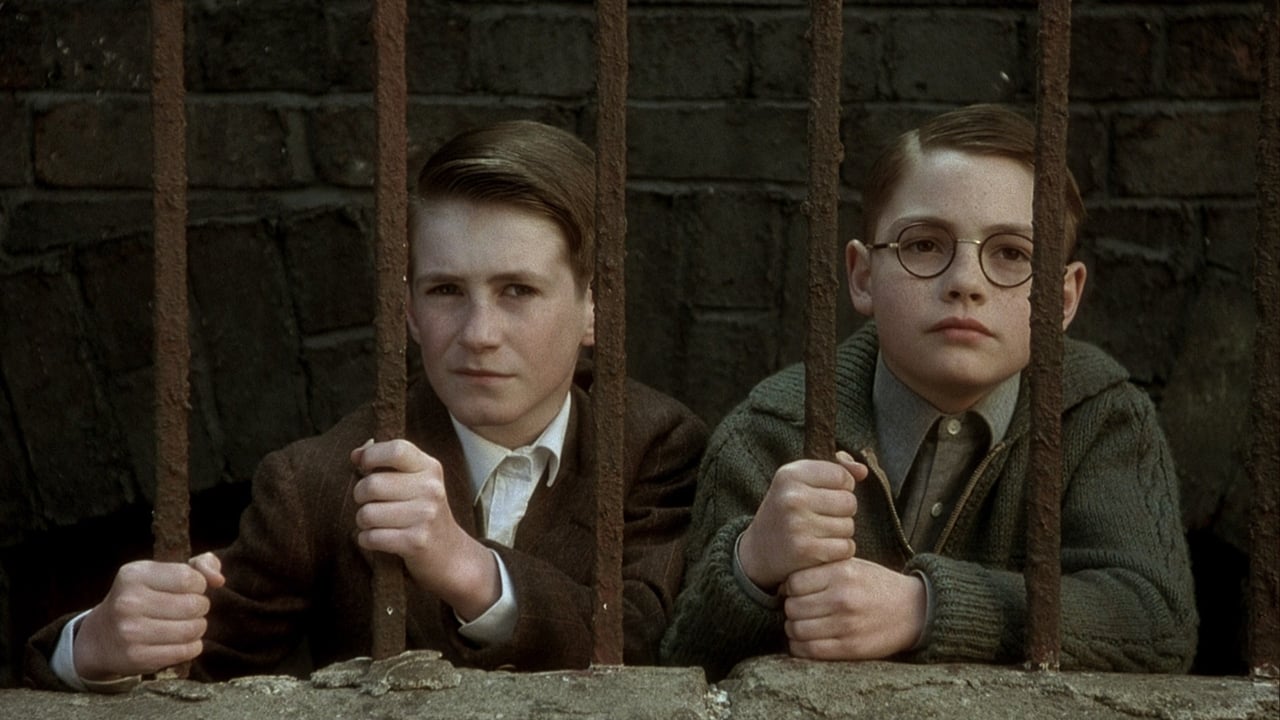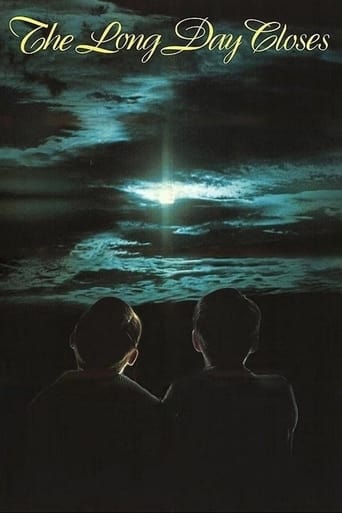Ceticultsot
Beautiful, moving film.
Organnall
Too much about the plot just didn't add up, the writing was bad, some of the scenes were cringey and awkward,
Brennan Camacho
Mostly, the movie is committed to the value of a good time.
sandover
Usually, my response to films in this register is that I write down something right afterwards. This film has tried me for some months now. It is a long time since I have been stupefied for some minutes after the film has ended, and then have given way to sobs out of outer beauty.I have to say right away that Terence Davies equates the long day of paradisaical childhood with the closure our life takes, and this is a take no great romantic poet has taken the chance, perhaps the cinematic chance, to express it so fully in images. And with such musical allegiance.Oh, to be exhausted in beauty! This is the destiny Terence Davies has in trust for us. None to my knowledge, even Bill Douglas to whom Terence Davies pays homage, has given us perhaps the definitive song childhood-to-adolescence love gives its shape to. It took me twice to gather that in the beginning, the rainy, abandoned street is the one early Bud meets for the last time his presumably co-pupil, as he passes him through with another boy to engage in play."The little stars climb, always reminding me that we're apart. You wandered down the lane and far away, leaving me a song that will not die" is what the voice of Charles Ray initiates us to through rain that falls onto that aforementioned abandoned street. But is it really abandoned? is what Davies' film asks us throughout. It gives way to vignettes coming out of childhood with such unabashed nostalgia and lyricism, but always, purposefully, vignettes, that it is a privilege of questioning only the great English and Irish poets Davies draws from have allowed.The image on the carpet so many childhoods have visited, turns now to the windowpane with music that only hints its epic potential via a slight turn of the camera. Soon afterwards, after a sublimely pathetic engagement of mother singing ancient tunes embracing the child, the child sitting by its own on the stairs (stairs the French say are so full of talking), opens up to a scene of shocking beauty with the whole family - mother occupying the front as Christ in the Last Dinner -wishing to Bud happy X-mas, while they are out in the street (that too, took twice a siting), and Mahler's music accompanies Bud and us to this private enraptured witnessing. Here the power passes from the ground to the eyes directly, suffused with an elegiac sustenance that follows out the rest of the film.Yet look also how the chirpy talk of the neighbors' informs the last chapter of initiation into what language in a fully telling and seductive way is. And then the camera lovingly revisits all places that define childhood in a cultural manner: cinema, religion, education. I here opt for the larger categories each place stands for in the sequence, for "Tammy" the song tells me so: the cinematic ray, and the summoning bell, and the film or radio transcripts that interfere with memory.The film transcripts. Ashes fall as it is evocative, and the camera moves for a final appreciation, as they trace their course. Then there's a tiny comic interlude (our teacher said - what? a serious false information, but, oh! so comically delightful!) before the Victorian astonishing attack. The long day closes in an overlapping of music and abandoning image over a submerged by light and clouds sky, descending, descending- Over what? Over the boys' last roof, the image on the carpet, the out-door X-mas and the common, local feast, the Dali-informed boo of the Christ as he turns over on the Cross, the melding and celebrating of the colors and sound (what a terrific sound design!) over what washes childhood. Away? It washed over me. It did.
ksandness
I saw this film with a group of friends, and people either loved it or hated it. As we discussed our reactions, it became clear that the people who hated it were looking for a plot and tuned out when they realized that there wasn't one.I felt somewhat the same way at first until I realized what Terence Davies was doing: He was filming childhood memories and fantasies exactly as he recalled them, with an emphasis on the differences between 1990s Britain and the Britain of his childhood: his sisters washing their hair in the sink and then going out on bicycles on a Saturday evening, homemade musical entertainments, and so on. Some memories were fragmentary, while others were more extensive.Once I realized what he was doing, I just sat back and let the beautifully shot images and evocative music flow over me. It was like peeking into someone else's mind and living bits of his everyday life. The movie stayed with me for a long time, and I began delving into my own childhood memories, wondering what they would look like on film.
e-carson
This movie has given me many hours of pleasure. Remarkably it offers nostalgia for places I have never seen and experiences I have never had. Do not seek fast moving excitement or slick dialogue when you go to see this film, but be prepared to wallow in its sad, wistful beauty. If you are a person who fares best in jovial company then perhaps this is not for you but if you have ever felt alone, or sad without knowing quite why, then you will recognise the chief character, Bud, played to perfection by Leigh McCormack. Of the many children appearing on our screens, often applauded excessively in my opinion, this child has to be one of the best in assuring the integrity of the project. There is no unnecessary music in the film but it is filled with gems which add to the overall feeling of nostalgia, as do the short soundtrack clips from cinema of the period. It is possible to switch this film on at any point and watch for a while as you might stand in front of a painting, but once I have started my VCR I cannot resist watching it in its entirety from the elegance of the title frames, through its succession of windows and its constant rain, to the inevitable fading of the light as the "long day closes".
roblenihan
"The Long Day Closes" has the kind of emotional impact that the Hollywood bunch could only dream about. There is very little in the way of plot--just a series of memories, as if a family photo album had come to life: like the family at Christmas time. No forced, artificial story lines, like Mama's Dying and We Gotta Pay the Rent--just a perfect rendering of a certain family at a certain time. If you're expecting some sappy tear-jerker, oh boy, do you have the wrong movie. The images here are so powerful, the use of music and old film dialog is so effective. I feel sorry for people who found this movie boring. You obviously didn't get it. Your loss.

